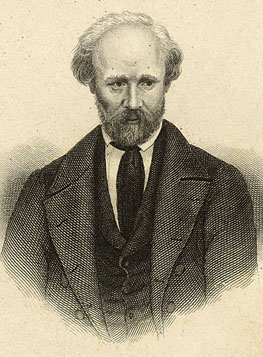| Friedrich Hebbel  AKA Christian Friedrich Hebbel AKA Christian Friedrich Hebbel
Born: 18-Mar-1813
Birthplace: Wesselburen, Schleswig-Holstein, Germany
Died: 13-Dec-1863
Location of death: Vienna, Austria
Cause of death: unspecified
Gender: Male
Race or Ethnicity: White
Occupation: Playwright, Poet Nationality: Germany
Executive summary: Die Niebelungen Trilogie German poet and dramatist, was born at Wesselburen in Ditmarschen, Holstein, on the 18th of March 1813. Though only the son of a poor bricklayer, he early showed a talent for poetry, which was first displayed to the world by the publication, in the Hamburg Modezeitung, of verses which he had sent to Amalie Schoppe (1791-1858), a then popular journalist and author of nursery tales. Through the kindness of this lady, who interested several of her friends on his behalf, he was enabled to go to Hamburg and there prepare himself for the university. A year later he went to Heidelberg to study law, but finding this uncongenial he passed on to the university of Munich, where he devoted himself to philosophy, history and literature. In 1839 Hebbel left Munich and wandered back to Hamburg on foot, where he resumed his relations with Elsie Lensing, whose self-sacrificing assistance had helped him over the darkest days in Munich. In the same year he wrote his first tragedy Judith (published 1841), which in the following year was performed in Hamburg and Berlin and made his name known throughout Germany. In 1840 he wrote the tragedy Genoveva, and the following year finished a comedy, Der Diamant, which he had begun at Munich. In 1842 he visited Copenhagen, where he obtained from the king of Denmark a small travelling studentship, which enabled him to spend some time in Paris and two years (1844-46) in Italy. In Paris he wrote his fine "tragedy of common life", Maria Magdalene (1844). On his return from Italy Hebbel met at Vienna two Polish noblemen, the brothers Zerboni di Sposetti, who in their enthusiasm for his genius urged him to remain, and supplied him with the means to mingle in the best intellectual society of the Austrian capital. The unwonted life of ease had its effect. The old precarious existence became a horror to him, he made a deliberate breach with it by marrying (in 1846) the beautiful and wealthy actress Christine Enghaus, ruthlessly sacrificing the girl who had given up all for him and who remained faithful until her death, on the ground that "a man's first duty is to the most powerful force within him, that which alone can give him happiness and be of service to the world": in his case the poetical faculty, which would have perished "in the miserable struggle for existence." This "deadly sin", which, "if peace of conscience be the test of action", was, he considered, the best act of his life, established his fortunes. Elise, however, still provided useful inspiration for his art. As late as 1855, shortly after her death, he wrote the little epic Mutter and Kind, intended to show that the relation of parent and child is the essential factor which makes the quality of happiness among all classes and under all conditions equal. Long before this Hebbel had become famous. German sovereigns bestowed decorations upon him; and in foreign capitals he was feted as the greatest of living German dramatists. From the grand-duke of Saxe-Weimar he received a flattering invitation to take up his residence at Weimar, where several of his plays were first performed. He remained, however, at Vienna until his death on the 13th of December 1863.
Besides the works already mentioned, Hebbel's principal tragedies are Herodes and Mariamne (1850); Julia (1851); Michel Angelo (1851); Agnes Bernauer (1855); Gyges und sein Ring (1856), and the magnificently conceived trilogy Die Nibelungen (1862), his last work (consisting of a prologue, Der gehörnte Siegfried, and the tragedies, Siegfrieds Tod and Kriemhilds Rache), which won for the author the Schiller prize. Of his comedies Der Diamant (1847), Der Rubin (1850), and the tragi-comedy Ein Trauerspiel in Sizilien (1845), are the more important, but they are heavy and hardly rise above mediocrity. All his dramatic productions, however, exhibit skill in characterization, great glow of passion, and a true feeling for dramatic situation; but their poetic effect is frequently marred by extravagances which border on the grotesque, and by the introduction of incidents the unpleasant character of which is not sufficiently relieved. In many of his lyric poems, and especially in Mutter and Kind, published in 1859, Hebbel showed that his poetic gifts were not restricted to the drama.
Father: (bricklayer, d. 1827)
Wife: Christine Enghaus (m. 1846, until his death)
Do you know something we don't?
Submit a correction or make a comment about this profile
Copyright ©2019 Soylent Communications
|